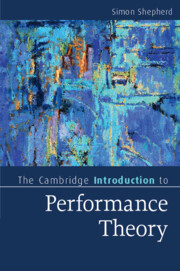Book contents
- Frontmatter
- Contents
- Preface
- Part I Definitions of performance
- 1 Sociology and the rituals of interaction
- 2 Theatre, ceremony and everyday life
- 3 Ethnography, folklore and communicative events
- 4 Cultural performance, social drama and liminality
- 5 Performance as a new sort of knowledge
- Part II The emergence of performance as sensuous practice
- Part III Theorising performance
- Closing note
- References
- Index
- Cambridge Introductions to …
4 - Cultural performance, social drama and liminality
from Part I - Definitions of performance
Published online by Cambridge University Press: 05 February 2016
- Frontmatter
- Contents
- Preface
- Part I Definitions of performance
- 1 Sociology and the rituals of interaction
- 2 Theatre, ceremony and everyday life
- 3 Ethnography, folklore and communicative events
- 4 Cultural performance, social drama and liminality
- 5 Performance as a new sort of knowledge
- Part II The emergence of performance as sensuous practice
- Part III Theorising performance
- Closing note
- References
- Index
- Cambridge Introductions to …
Summary
While the folklorists were trying to identify the ways in which ‘performance’ could be related to and distinguished from everyday behaviours, other cultural anthropologists were interested in the social functions of events that were clearly framed as performances. This area of inquiry took anthropology very close to analysis not merely of non-theatrical performances but also of aesthetic theatre itself. For our purposes here, this development is interesting because it works towards a concept of performance as an overarching category which includes a variety of different kinds of event.
The research in this area is usually assumed to start with the work of Milton Singer in Madras in the mid-1950s. It had come out of the same School of Sociology at Chicago as produced the work of Goffman and Becker. At Chicago Singer worked alongside Robert Redfield and other colleagues to explore the role of cities within social and cultural modernisation. This role was particularly interesting in the case of a city which was so thoroughly governed by traditional beliefs and practices as was Madras. Singer came to believe that he could understand the operation of these beliefs, and their role in resisting or negotiating change, by watching religious ceremonies, which he categorised as ‘cultural performances’. He developed this approach on the advice of an Indian colleague, the great Sanskrit specialist, Venkataraman Raghavan. So we should note, in passing, that, insofar as ‘cultural performance’ is one of its foundational concepts, the extended notion of performance that we now accept has one of its points of origin in the Indian academy.
Singer, be it said, placed great value on his Indian colleagues even though his was the only name that went into the western publishing machine, with his first book, Traditional India (1959), consisting of essays by various authors, including Raghavan, and published by the American Folklore Society. The concept of cultural performance was more fully developed in a later book, When a Great Tradition Modernizes, in 1972. Here Singer explained how Indian friends thought of their civilisation as ‘encapsulated’ in the performances of religious ceremonies: ‘The performances became for me the elementary constituents of the culture and the ultimate units of observation.’ Each of these units has ‘a definitely limited time span, a beginning and an end, an organized program of activity, a set of performers, an audience, and a place and occasion of performance’ (1972: 71).
- Type
- Chapter
- Information
- The Cambridge Introduction to Performance Theory , pp. 42 - 46Publisher: Cambridge University PressPrint publication year: 2016



